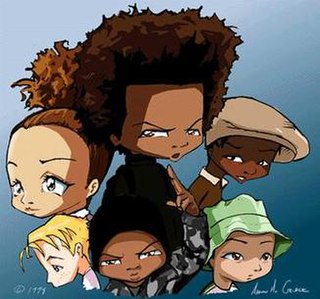Related Research Articles

William Boyd Watterson II is an American cartoonist who authored the comic strip Calvin and Hobbes. The strip was syndicated from 1985 to 1995. Watterson concluded Calvin and Hobbes with a short statement to newspaper editors and his readers that he felt he had achieved all he could in the medium. Watterson is known for his negative views on comic syndication and licensing, his efforts to expand and elevate the newspaper comic as an art form, and his move back into private life after Calvin and Hobbes ended. Watterson was born in Washington, D.C., and grew up in Chagrin Falls, Ohio. The suburban Midwestern United States setting of Ohio was part of the inspiration for the setting of Calvin and Hobbes. Watterson lives in Cleveland Heights, Ohio as of January 2024.

A comic strip is a sequence of cartoons, arranged in interrelated panels to display brief humor or form a narrative, often serialized, with text in balloons and captions. Traditionally, throughout the 20th and into the 21st century, these have been published in newspapers and magazines, with daily horizontal strips printed in black-and-white in newspapers, while Sunday papers offered longer sequences in special color comics sections. With the advent of the internet, online comic strips began to appear as webcomics.

Dilbert is an American comic strip written and illustrated by Scott Adams, first published on April 16, 1989. It is known for its satirical office humor about a white-collar, micromanaged office with engineer Dilbert as the title character. It has led to dozens of books, an animated television series, a video game, and hundreds of themed merchandise items. Dilbert Future and The Joy of Work are among the best-selling books in the series. In 1997, Adams received the National Cartoonists Society Reuben Award and the Newspaper Comic Strip Award for his work. Dilbert appears online and as of 2013 was published daily in 2,000 newspapers in 65 countries and 25 languages.

Doonesbury is a comic strip by American cartoonist Garry Trudeau that chronicles the adventures and lives of an array of characters of various ages, professions, and backgrounds, from the President of the United States to the title character, Michael Doonesbury, who has progressed over the decades from a college student to a youthful senior citizen.

Garfield is an American comic strip created by Jim Davis. Originally published locally as Jon in 1976, then in nationwide syndication from 1978, it chronicles the life of the title character Garfield the cat, Odie the dog, and their owner Jon Arbuckle. As of 2013, it was syndicated in roughly 2,580 newspapers and journals; the comic held the Guinness World Record for being the world's most widely syndicated comic strip.

The Far Side is a single-panel comic created by Gary Larson and syndicated by Chronicle Features and then Universal Press Syndicate, which ran from December 31, 1979, to January 1, 1995. Its surrealistic humor is often based on uncomfortable social situations, improbable events, an anthropomorphic view of the world, logical fallacies, impending bizarre disasters, references to proverbs, or the search for meaning in life. Larson's frequent use of animals and nature in the comic is popularly attributed to his background in biology. The Far Side was ultimately carried by more than 1,900 daily newspapers, translated into 17 languages, and collected into calendars, greeting cards, and 23 compilation books, and reruns are still carried in many newspapers. After a 25-year hiatus, in July 2020, Larson began drawing new Far Side strips offered through the comic's official website.

George Joseph Herriman III was an American cartoonist best known for the comic strip Krazy Kat (1913–1944). More influential than popular, Krazy Kat had an appreciative audience among those in the arts. Gilbert Seldes' article "The Krazy Kat Who Walks by Himself" was the earliest example of a critic from the high arts giving serious attention to a comic strip. The Comics Journal placed the strip first on its list of the greatest comics of the 20th century. Herriman's work has been a primary influence on cartoonists such as Elzie C. Segar, Will Eisner, Charles M. Schulz, Robert Crumb, Art Spiegelman, Bill Watterson, and Chris Ware.

Print syndication distributes news articles, columns, political cartoons, comic strips and other features to newspapers, magazines and websites. The syndicates offer reprint rights and grant permissions to other parties for republishing content of which they own and/or represent copyrights. Other terms for the service include a newspaper syndicate, a press syndicate, and a feature syndicate.

The Boondocks was a daily syndicated comic strip written and originally drawn by Aaron McGruder that ran from 1996 to 2006. Created by McGruder in 1996 for Hitlist.com, an early online music website, it was printed in the monthly hip hop magazine The Source in 1997. As it gained popularity, the comic strip was picked up by the Universal Press Syndicate and made its national debut on April 19, 1999. A popular and controversial strip, The Boondocks satirizes African American culture and American politics as seen through the eyes of young African American radical Huey Freeman. McGruder's syndicate said it was among the biggest launches the company ever had.

King Features Syndicate, Inc. is an American content distribution and animation studio, consumer product licensing and print syndication company owned by Hearst Communications that distributes about 150 comic strips, newspaper columns, editorial cartoons, puzzles, and games to nearly 5,000 newspapers worldwide. King Features Syndicate also produces intellectual properties, develops new content and franchises, and licenses its classic characters and properties.

Helix High School, or Helix Charter High School, is a charter high school in La Mesa, California, built in 1952. It received its charter in 1998. Helix is part of the Grossmont Union High School District, and serves a mid-level socioeconomic community. It has a student body of approximately 2,400 pupils. Helix serves parts of La Mesa, Lemon Grove, and Spring Valley; however, as a charter school, all high school students in the state of California are eligible to attend.
Universal Press Syndicate (UPS), a subsidiary of Andrews McMeel Universal, was an independent press syndicate. It distributed lifestyle and opinion columns, comic strips and other content. Popular columns include Dear Abby, Ann Coulter, Roger Ebert and News of the Weird. Founded in 1970, it was merged in July 2009 with Uclick to form Universal Uclick.

Gustavo "Gus" Arriola was an American comic strip cartoonist and animator, primarily known for the comic strip Gordo, which ran from 1941 through 1985.
Darrin Bell is a Pulitzer Prize-winning American editorial cartoonist and comic strip creator known for the syndicated satirical comic strips Candorville and Rudy Park. He is a syndicated editorial cartoonist with King Features.

Ilan Stavans is an American writer and academic. He writes and speaks on American, Hispanic, and Jewish cultures. He is the author of Quixote (2015) and a contributor to the Norton Anthology of Latino Literature (2010). He was the host of the syndicated PBS show Conversations with Ilan Stavans, which ran from 2001 to 2006.

GoComics is a website launched in 2005 by the digital entertainment provider Uclick. It was originally created as a distribution portal for comic strips on mobile phones. However, in 2006, the site was redesigned and expanded to include online strips and cartoons. GoComics publishes editorial cartoons, mobile content, and daily comics. It is currently owned by Andrews McMeel Universal.
A comic strip syndicate functions as an agent for cartoonists and comic strip creators, placing the cartoons and strips in as many newspapers as possible on behalf of the artist. A syndicate can annually receive thousands of submissions, from which only two or three might be selected for representation. In some cases, the work will be owned by the syndicate as opposed to the creator. The Guinness World Record for the world's most syndicated strip belongs to Jim Davis' Garfield, which at that point (2002) appeared in 2,570 newspapers, with 263 million readers worldwide.

Popeye the Sailor is a fictional cartoon character created by Elzie Crisler Segar. The character first appeared on January 17, 1929, in the daily King Features comic strip Thimble Theatre. The strip was in its tenth year when Popeye made his debut, but the one-eyed sailor quickly became the lead character, and Thimble Theatre became one of King Features' most popular properties during the 1930s. Following Segar's death in 1938, Thimble Theatre was continued by several writers and artists, most notably Segar's assistant Bud Sagendorf. The strip continues to appear in first-run installments on Sundays, written and drawn by R. K. Milholland. The daily strips are reprints of old Sagendorf stories.

Andrews McMeel Syndication is an American content syndicate which provides syndication in print, online and on mobile devices for a number of lifestyle and opinion columns, comic strips and cartoons and various other content. Some of its best-known products include Dear Abby, Doonesbury, Ziggy, Garfield, Ann Coulter, Richard Roeper and News of the Weird. A subsidiary of Andrews McMeel Universal, it is headquartered in Kansas City, Missouri. It was formed in 2009 and renamed in January 2017.

Lalo Alcaraz is an American cartoonist most known for being the author of the comic La Cucaracha, the first nationally syndicated, politically themed Latino daily comic strip. Launched in 2002, La Cucaracha has become one of the most controversial in the history of American comic strips.
References
- ↑ Artze, Isis (2000). "Building Characters". Hispanic. 10 (13): 36. Retrieved October 20, 2018.
- 1 2 3 Seth Wolf (October 12, 2004). "San Francisco Bay Guardian Arts and Entertainment". Sfbg.com. Archived from the original on September 10, 2012. Retrieved August 20, 2012.
- ↑ "'La Cucaracha' Goes Nationwide". NPR. January 1, 2003. Retrieved August 20, 2012.